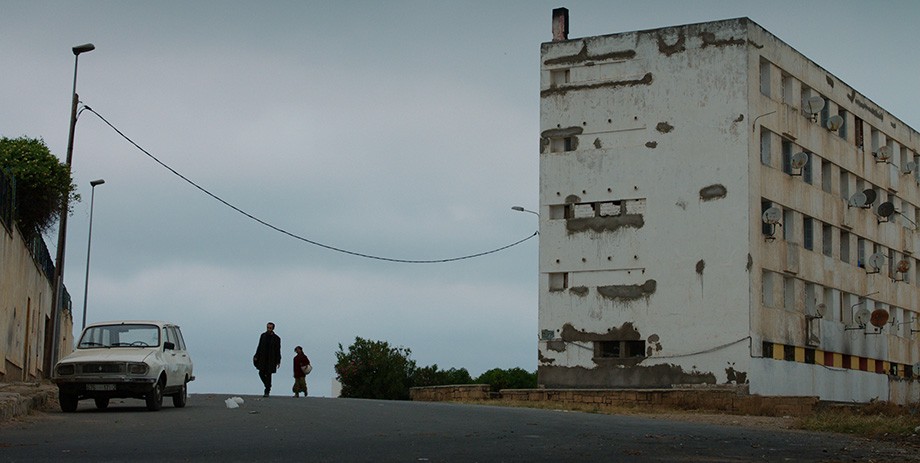Tala Hadid was born in London, graduated from Columbia University in New
York City, and participated in the Sundance Institute Directors Lab. Her films
include the documentary feature Sacred Poet, the short film “Your
Dark Hair Ihsan,” which won the Panorama Short Film Award at Berlin, and her
latest, The Narrow Frame of Midnight.
Hadid’s drama centers on the intersecting destinies of three people — a Moroccan-Iraqi writer searching for his brother, the lover whom he left behind, and a young orphan on the run — and creates an incisive and unsettling portrait of a land riven by violence and fundamentalism. (TIFF official site)
The Narrow Frame of Midnight will play at TIFF on September 5, 6, and 14.
WaH: Please give us
your description of the film playing.
TH: The Narrow Frame of Midnight charts the
journeys of several characters as they struggle to find their place in the
world. The paths of these characters intersect at different points in the film and,
though their destinies eventually diverge, they are connected in profound ways.
Three of the characters (Aïcha, Zacaria, and Judith) are people
who are searching; they are explorers who at different points decide to take
the leap and embark on a voyage whose end is unknown. The Greeks believed, as
writer Jeanette Winterson reminds us, that the hidden life demands invisible
ink. And so, in a way, the characters with whom we travel in The Narrow
Frame of Midnight are people who have decided to discern the hidden
story within themselves and to continue to write it at any cost.
WaH:
What drew you to this story?
TH: I’m a London-born, US-educated woman of Moroccan and
Iraqi descent; sometimes I feel that I have a foot in both/all worlds.
This hybrid existence, though sometimes complicated, is also a space of freedom
that allows a particular way of seeing — to belong to all, and yet to none. I
wanted to make this film to explore questions that deal with this state of
being “in between” things and what it means to look at the world anew with, as
much as is possible, a clear and untainted sight.
WaH:
What was the biggest challenge in making the film?
TH: There are more obstacles than one can imagine during
the process of making a film. Apart from trying to keep a clear and balanced
head, equilibrium in the face of what seems impossible, and endurance and
willpower when all energy is spent, what is essential is to maintain a clear
eye on the work itself (the most important thing) and belief in the project and
the world at large.
WaH:
What do you want people to think about when they are leaving the theatre?
TH: I hope that when people see the film, that they
leave with questions about the world they live in, that they come to understand
that perhaps what is important is not so much the answer but the question
itself: a lucid questioning that might lead down a just and good path.
WaH:
What advice do you have for other female directors?
TH: It’s a marathon, not a sprint!
WaH:
How did you get your film funded?
TH: The film was financed via an international
co-production structure with additional support from granting institutions,
small grants, loans from individuals, and some in-kind post-production
investment. The film was initially supported by the Sundance Film Institute
Feature Film Program and the British Film Institute.
From there, successful
applications were made to the Centre Cinématographique Marocain (CCM) in
Morocco and the Doha Film Institute (DFI), as well as the Fonds Francophone
Audiovisuelle du Sud in France. In addition, when a piece of the institutional
funding was not forthcoming due to an internal circumstance beyond the
production’s control, deferrals were taken across the whole above-the-line. This was a challenging moment, and I was greatly moved by the solidarity
shown by my colleagues.
WaH:
Name your favorite women-directed film and why.
TH: Brief Encounters (1967)
by Kira Muratova. Its rigorous, poetic, and intelligent exploration of
time, memory, and love epitomizes the best of Soviet cinema. Both this film and
her second one, Long Farewells (1971), were banned by censors for over 15 years, and she was expelled from the Filmmakers’ Union.
With great modesty and perseverance, she never gave up. Many years after
she made her first film, at an event dedicated to her work, she was quoted as
saying: “I had always known that my films would come out some day. Only I did
not believe that I myself would live to see that day.”







